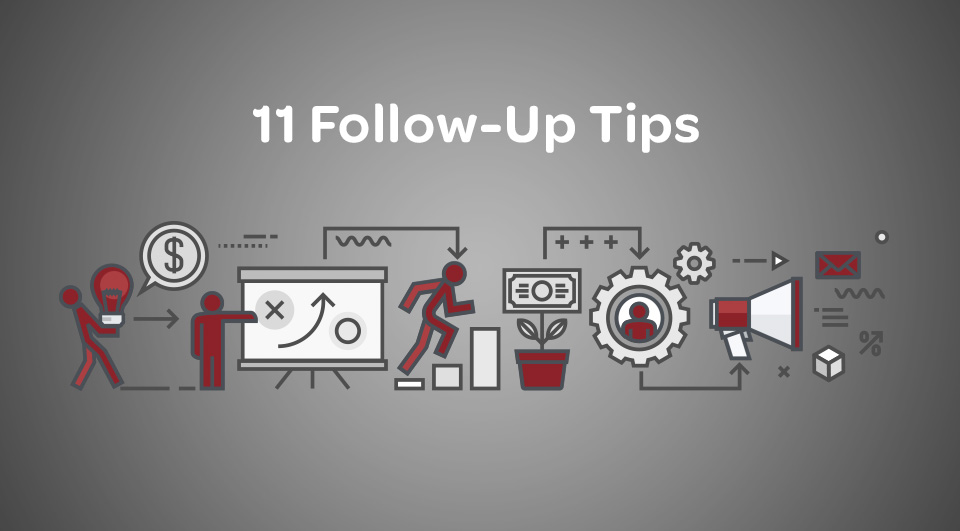This is the third post in our guest blogger series, written by Paul Dodd, Ideas Man from ALLGOOD. Paul is a branding and marketing expert, professional speaker and also the man behind the Not Just Numbers brand.
Building trust, credibility and likeability is the key to securing new business. You do this by following up each stage of your sales process, every time without fail.
Selling is hard work. People are resistant, competition is fierce and budgets are often an issue.
So, when prospects are warmed up to you their expectations are already high. They want to feel valued and important as their time is precious and their money is tight.
To build trust you simply make and keep promises.
People need to know what’s going on, so you have to inform them of the plan and then do it. The worst thing for a prospect or client is to not know what’s going on. To be left in limbo is far worse than knowing something will be late, over budget or wrong. If you say it’ll be 2 days, make sure it’ll be 2 days. If you really can’t then just call and explain why.
The 11 Follow-ups You Should Always Do
If you consistently do all of these your trust level will be off the scale.
1. Follow up your networking events
Book meetings or calls with the really interesting people. Ask everyone else if they’d like to receive your free download, newsletter, quarterly tips, free seminar invites….etc. Put every single business card into a CRM for future campaigns.
2. Follow up your first meeting
Even if it’s just to say thank you for meeting, it just acknowledges the time people have spent with you. You could also give a nod on your chosen social media channel. You can take it one step further and send them an interesting book or something relevant to your meeting. Re-iterate what will be happening next.
3. Follow up a request
If you receive an email or web enquiry, at least acknowledge that you’ve received it and will be working on it. If someone needs to follow-up to see if you received their request…that’s the wrong way round.
4. Follow up your proposals
This is the key to conversion. Always follow up in the first few days to see if they need any help. Email is alright, phone is best. Then try and follow up at agreed time periods such as 1 week, 1 month, 3 months etc based on your own sales process.
5. Follow up a referral you’ve received
Always phone the direct referrals you get. I know this sounds obvious, but you wouldn’t believe the number of referrals that get passed and never followed up, either because they make a snap judgement on whether there is anything in it, are too busy or don’t record the referral in their system and forgot about it.
6. Follow up a referral you’ve given
If you’re a referral giver, do you ever follow up to see how they’ve gone? After all, your reputation is on the line when you refer someone.
7. Follow up a question, mention or direct message
On social media, if you get a direct message, question or significant mention make sure you personally follow it up. Now you don’t have to reply to every retweet or mention, but make sure any new contacts receive a bit of attention as they’ve taken time to interact with you, the least you can do is acknowledge it.
8. Follow up a direct campaign
If you run any specific campaigns, follow up any interested people, or anyone who’s interacted in any way with your campaign. Again, seems obvious, but people can sometimes be selective in their follow-up, selecting only people they ‘think’ are good leads. How can you know at this point? They might not be great, but could easily know your best new prospect.
9. Follow up an event or exhibition
Again, all the cards you get, the people who fill in your iPad app on the stand, the people who try and win the champagne and any other interactions all need some kind of systemised follow up.
10. Follow up with a client you’ve not dealt with for a while
If a client has fallen by the wayside, they are the easiest to interact with. They already know you and are receptive to a quick call or email. Who haven’t you dealt with for a few years?
11. Follow up a problem
This one is key. If a client identifies a problem, however small or big, you need to acknowledge it. Might seem obvious again, but how many people hide and hope a problem will go away? All the client wants is some acknowledgement, even it it’s going to take months to solve at least they know. Not knowing anything is a lot worse.
Phew, that’s a lot of following up. What about actual work?
This is what great sales people do day in day out, this is actual work when your job is to sell.


